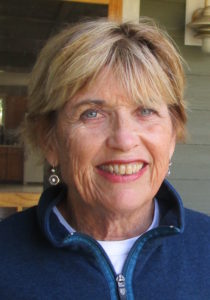
By QUINTON SMITH/YachatsNews.com
YACHATS – The Yachats City Council voted 3-2 Wednesday to offer a contract to a new resident who spent the last 12 years overseeing a $10 million, 200-employee nonprofit in Eugene.
It was not an inspiring vote to hopefully end the council’s fumbling, divisive and disorganized nine-month homemade search for a permanent city manager to lead a city with a $1.66 million yearly budget and 10 employees.

It’s also an effort that could come up empty.
The council may deserve it. But the city doesn’t. And most people hope the community can recover and that the mishandled process doesn’t end with a rejection.
Although Yachats is a tiny city, many of its citizens and volunteers want to get a lot done – to start or complete projects that have been frozen in time for more than a year because of a lack of staff or leadership.
There are important decisions to make on capital spending, including a library expansion, a requested $400,000 rebuild of the Little Log Church, making the grass field behind city hall more inviting and useful, or building a boardwalk along Ocean View Drive. And those aren’t the truly necessary stuff like water security, sewers and streets, and maybe even affordable housing.
As longtime city financial adviser Tom Lauritzen told the Finance Committee on Tuesday after hearing about the city’s robust budget situation: “We’re doing a good job receiving money; now it’s time to see how we want to spend it.”
There is just too much at stake for the city manager search to misfire.

A month ago the City Council decided to negotiate a contract with Gretchen Dubie, one of two finalists for the city manager’s job. That was after two private interviews with the council, a session with commission chairs, two question-and-answer meetings with the public, reference calls, and a formal background check.
The designated negotiators — Mayor Leslie Vaaler and Councilor Ann Stott — talked just once with Dubie to go over key areas of the contract, including duties, pay, benefits, severance and all the details that an “at will” government official tries to get settled before accepting a job. But until the contract was posted online Tuesday as part of the council’s meeting packet, Dubie never saw anything in writing.
That’s unusual and unorthodox in any search for a chief executive officer.
It’s also unusual and unorthodox that a city council was still publicly debating Wednesday small details in the contract months after the search started and 1-2 days before its lone candidate actually saw it.
It’s also not certain that Dubie will agree to the terms – or will want to work for a council that has shown it cannot operate clearly and effectively and has yet to show it can properly oversee a chief executive.
“We’re still lucky to have someone waiting this long,” Councilor Anthony Muirhead said in frustration at one point during the council’s 90-minute thrashing around Wednesday. “If it wasn’t someone already living in Yachats and wanting this job, they’d already be hired somewhere else and we’d be once again without a city manager.”
If she accepts the job, it’s not a given that Dubie will succeed. While she has two decades of managerial experience in Lane County, she’s worked in a quasi-governmental setting, not a municipal one. The council wanted a more professional manager — and it may have found one. Or Dubie found Yachats. But it’s still a “working” job. A Yachats city manager has to simultaneously be able to talk about water policy and capital improvement budgets while helping answer the phones, help reboot city hall computers, change the reader board outside the Commons, and run down to the pavilion on a Saturday afternoon when it needs to be unlocked — all while patiently listening to Yachats residents talk about their most important issues.
A homemade search
Maybe the effort by a mayor and council inexperienced both in governing and hiring people was doomed from the start.
Several council members did not like the process and search firm used to fill the city manager’s job in 2017. They convinced a majority they could have more control over the process if they did it themselves – while down to two employees in city hall – and despite just one of the five councilors having any experience recruiting or hiring people.

As is her tendency, Vaaler also wanted to save the $20,000 that it costs to use a firm experienced in filling municipal jobs to recruit and screen candidates and then help negotiate a contract.
But, in trying to save $20,000 in a budget flush with cash, the council may have quickly spent all the goodwill it had when a majority took office in January. It has also led Vaaler and Councilor Mary Ellen O’Shaughnessey to tell a few people they won’t seek election next November.
It’s also an unusual situation because the five council members generally get along, don’t seem to have outlandish personal agendas, work hard, and care about the community.
Getting involved in Yachats’ government work is pretty simple and is very accessible, compared with larger communities. Without any prior government experience, all someone has to do is show up, pay a little attention, raise a hand and soon they’re sitting on a committee, commission and maybe even the city council by appointment (two of the current five members are appointed) or election.
And unlike previous years when council work was known only to the 20 or so people who attended its twice monthly meetings, now – for better or worse, depending on who you ask – YachatsNews closely covers their discussions, debates and decisions and posts it for thousands of people to see.
How we got here
Foreseeing a newly elected council hostile to her, former city manager Shannon Beaucaire left for the Willamette Valley city of Carlton in March. The new council needed to find an interim manager to hold down the fort while it decided how to proceed.
As its first interim manager, the council hired Lee Elliott of Texas, who had spent the previous six years in a variety of short-term municipal jobs in the Southwest. Some councilors hoped he would take the job permanently, but he lasted a little more than two months before deciding Yachats was too small. After he left, councilors also discovered he didn’t do a whole lot.

Pushed by Vaaler to find someone more local, the council turned to Katherine Guenther, a longtime resident, former realtor and Planning Commission member who had just become the city’s two-day-a-week planner. Guenther’s lack of municipal experience, the attempt to do both jobs and the departures of two key staffers sent city hall operations into chaos. At one point, phones went unanswered and Guenther publicly pleaded with council members to stop dropping by just to chat so she could get some work done.
Elliott in May and Guenther in June repeatedly urged the council to begin a search for a permanent manager.
By July, the council had decided to proceed. It took another month of work and haggling to develop a job description and a recruitment brochure and send out the notice.
Guenther declined to apply for the permanent position even after the job description was tweaked to entice her to do so. Privately, Yachats’ effort was roundly derided by others in local governments around Lincoln County.
The result was that Yachats got 14 applications, none from people experienced in helping run a city.
Dubie had been visiting Yachats for decades and purchased a house just north of town in October 2020. She left the Oregon Supported Living Program in Eugene in July when her husband took a job at the Angell Job Corps Center and after the toll of operating a 200-employee operation during the coronavirus pandemic became too much. She saw the city’s advertisement and applied at the last minute.
“… I believe I can offer a fresh perspective for the city,” Dubie wrote in her August application cover letter. “I am not enmeshed or emotionally attached to the various issues and ‘speed bumps’ that the city has recently experienced in the turnover of their leadership staff and project leads, and believe I can lend a neutral and professional perspective to the position.”
After several meetings and interviews, the council narrowed the field to two finalists, Dubie and Helen Anderson of Yachats, a former city contractor and member of the Planning Commission.
Messy details, discussion Wednesday
Council members publicly and privately clashed over the terms of the proposed contract offer. Vaaler fought to keep the city manager’s salary and benefits the same as Guenther’s — $80,000 a year — and wanted vacation time to begin at two weeks, like union employees. Stott argued against that.
On Wednesday the council compromised and voted unanimously to offer Dubie a starting salary of $90,000 with the chance of a $5,000 raise after an evaluation in nine months. Vacation time was put at four weeks. Both are less than Dubie was getting in Eugene and the salary is less than Beaucaire received her last year in Yachats.
After a long, contentious discussion the council voted 4-1 Wednesday – with Vaaler voting no — to not link the city manager’s proposed contract the policy manual for union employees.

As he had since the summer, Councilor Greg Scott said at some point the council had to trust someone to run the city.
“I interpret this as a trust issue,” he said during the arguments over contract wording. “The council is sending a message that we want to micromanage this position much more than I feel is necessary.”
The council also disagreed on to handle – and who should see – the official background check done by an outside service. It finally decided that Vaaler, O’Shauhnessey and Guenther would look at it – and to call a special meeting if there were issues. It is highly unusual for another employee who will eventually report to the new city manager to view an official background check. But Vaaler insisted on it.
Council members then disagreed whether the two votes on contract details meant that the city was making a formal offer to Dubie. So it took a formal vote on that – with Vaaler and O’Shaughnessey on the short end of the 3-2 decision.

For O’Shaughnessey it was the second time voting against making an offer to Dubie. She was the lone opposing vote in November to begin negotiations.
On Wednesday, O’Shaughnessey said her vote “was a very tough decision” without saying why. But she and Vaaler said they would work to help Dubie succeed – if she agrees to the contract.
“I want to do everything I can to make sure Gretchen is successful,” O’Shaughnessey said. “We all want Gretchen to succeed. Gretchen’s success is the community’s success.”
Dubie has to succeed — if she takes the job. There’s too much at stake. Even for a small town.
- Quinton Smith, a longtime Oregon journalist, is the founder and editor of YachatsNews.com and can be reached at YachatsNews@gmail.com



I really enjoy your style of reporting exactly told from an unbiased perspective; the way it should be for all reporting. Keep it coming
Thank you for this succinct description of events. Hopefully some lessons have been learned and we never again treat anyone the way Ms. Dubie has been treated.